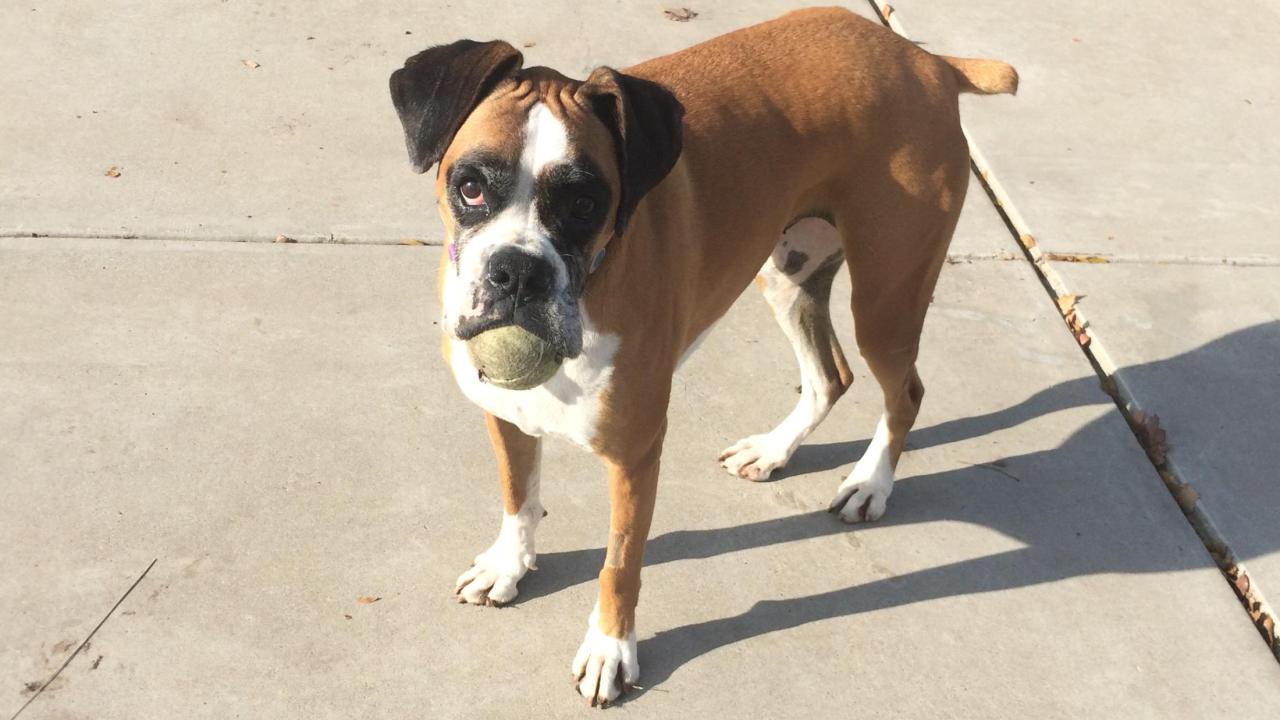
Month-Long Radiation Treatments Help Dog Recover from Non-Surgical Tumor
Porsche, a 4-year-old female boxer, had a lipoma surgically removed from her hip and lower back in 2019. But when it came back even worse in 2020, her primary veterinarian referred her to the Oncology Service at the UC Davis veterinary hospital. So, her owners Chuck and Jennifer drove the 90 minutes to campus for a consult with the oncologists.
Porsche’s lipomas was determined to be an infiltrative lipoma, a benign growth of fat cells. Although benign, Porsche’s mass was large enough to potentially cause pain or lameness. Infiltrative lipomas tend to send out tendrils so that they are harder to remove fully. These are very locally invasive and have a high tendency to recur following surgery. The infiltrative nature of these tumors means that the tumor invades deep tissue structures such as muscle, nerves, and bone, which is why surgical removal is difficult and sometimes impossible.
With a CT scan, it was apparent that Porsche's infiltrative lipoma extended into the muscles near the bones of her vertebral column as well as muscles on her right pelvic limb. Given the extent of her tumor, surgeons and oncologists decided the best course of action was to treat the mass with radiation instead of surgical removal.
Porsche was started on a routine of 20 radiation treatments over the course of a month. Each treatment on the hospital’s state-of-the-art linear accelerator required her to be anesthetized.
“Porsche loved her daily drives to UC Davis,” said Jennifer. “She was always happy to see her technicians and doctors when they would come out to pick her up in the parking lot. She was a brave, good girl throughout her treatments, making friends with all the staff.”
Porsche had a rough couple of weeks following the completion of her treatments, according to Jennifer. Radiation treatments can leave painful and itchy burns. The veterinarians commended Chuck and Jennifer for their ability to keep her from scratching the area.
“She got extra love and special treats,” Jennifer said. “She soon returned to her fun loving, wiggle-butt self – running all over the yard and chasing squirrels and gophers.”
Porsche’s family qualified for financial assistance through a generous grant from the Blue Buffalo Foundation’s support of the Petco Foundation pet cancer treatment program at the UC Davis veterinary hospital. The grant helps support treatments for domestic companion animals suffering from cancer. The project is designed to support pet parents of modest means or pet parents whose pets provide a service to others.
“We are so thankful that we were offered the Petco/Blue Buffalo grant to help cover the costs of her treatments,” Jennifer said. “Being retired, we were concerned that our options would be limited financially. Thank you so much for making it possible for Porsche to receive the very best treatment available.”
# # #
